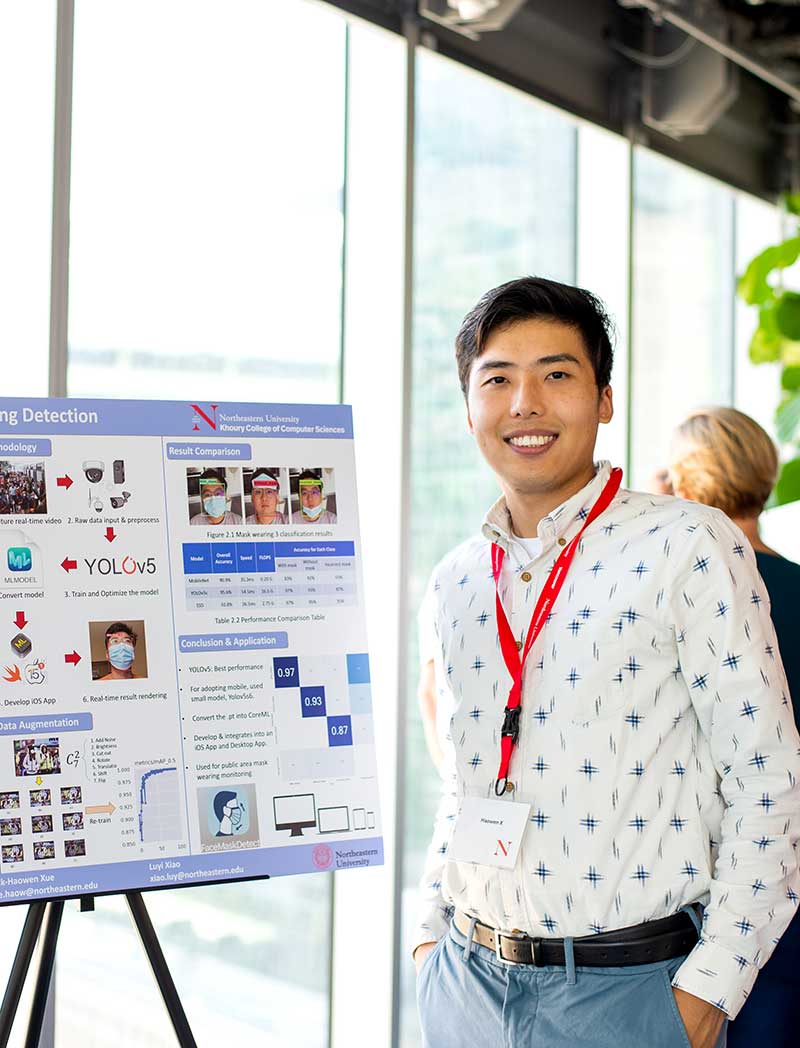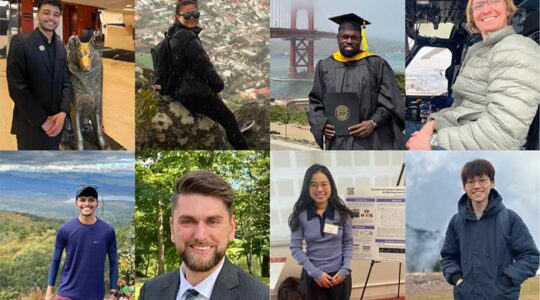Master’s Research at Khoury College
Encouraging student pioneers




Khoury College master’s students participate in a full spectrum of research across the Northeastern Global Campus system, from Boston to Vancouver. Project-based courses and master’s theses provide a curriculum-based format, and some campuses, such as Vancouver, include an industry-partnered research capstone as part of their program.
Throughout the year, there is programming to inform students about research activities and opportunities happening at the university and beyond. One major research experience is the prestigious Khoury Research Apprenticeship program.
Capstone projects: Uncovering what’s possible
Khoury master’s students in the MS Data Science and MS Cybersecurity programs have capstone embedded in the curriculum, and completing a semester-long capstone project that synthesizes different learning areas and solves a real-world problem is part of every Vancouver graduate student’s journey.
Research Apprenticeship program
Started in fall of 2019, the Khoury Research Apprenticeship is a unique program held in the Fall and Spring semesters that provides current master’s students the opportunity to participate in relevant research projects while being mentored and supported by faculty advisors. The Khoury Research Apprenticeship is a hands-on opportunity to explore your current research interests, or to pave a pathway to a future PhD upon the completion of your master’s. The experience is capped off with a research showcase that highlights what you’ve learned and celebrates your work.
Faculty and academic advisors nominate students who demonstrate strong academic skills and have shown affinity and talent for research. Faculty present proposals for research projects which apprenticeship recipients can join. Once nominated, students apply to the projects they are interested in, followed by an interview with the corresponding faculty member and a committee review to finalize the selections.
A sample of 2025 Apprenticeship participants and their projects:
- Jiawen Cai: An Interactive Platform Evaluating LLMs' Persuasive Abilities
- Abhijeet Chowdhury: Applying Tiling Theory to Extend Art Made from Gen AI
- Katie Elyse Song: Better Passwords Through Oblivious Pseudorandom Function
Master’s thesis
Khoury College master’s students have the opportunity to pursue empirical research on a focused topic that goes beyond a class project or internship. The research may take root in a projects course or during a research assistantship in one of our labs. Students typically decide to do a master’s thesis in order to consolidate and disseminate their knowledge.
The master’s thesis consists of eight semester hours of research, culminating in the master’s thesis. While it will be your responsibility to find a thesis advisor, you can get help and advice from an academic advisor in the graduate program on reaching out to individual faculty and understanding the thesis process and policies.

Examples of master’s thesis topics include:
- ICS/SCADA security research
- An instrumentation framework for understanding the usage and performance of data structures
- Deep multi-agent reinforcement learning
- Language generation and instruction following
2025 Graduate Research Award winner: Lana Do
After getting a degree in industrial engineering at the University of Illinois Urbana-Champaign, computer science master’s student Lana Do was ready for a change of climate. She joined the Align program and after taking a few machine learning classes and serving as a research assistant, she became interested in research. Since then, she has coauthored a paper and is currently working on research to help blind and low-vision users by using AI to create audio descriptions for social media content.
2024 Graduate Research Award winner: Zhiyuan (David) Yang
With a unique undergraduate background in landscape architecture, Yang hit the ground running at Khoury College during his Align Master’s program. He worked with three different faculty to co-author and publish multiple papers in addition to his capstone study. For his capstone course, Yang led a team to develop an innovative zero-shot emotion evaluation system for videos using multi-modal methods and large language models, in which the computer model can estimate emotional intensity of video subjects.


